Quick Summary: AI trip planner app development is changing how travel companies design experiences for modern travelers. This blog covers why intelligent itinerary apps matter, the benefits for businesses, must-have features, backend systems, costs, and development steps. With clear strategies and insights, it explains how travel brands can build AI-powered travel booking apps that improve loyalty, reduce churn, and drive revenue growth in 2025–26.
Planning a trip once meant endless tabs, phone calls, and complicated comparisons. Trip planner app development in 2025 is changing that experience by making the process faster, smarter, and easier for travellers.
In March 2024, nearly one in four travellers in the U.S. and Canada used generative AI to plan trips, says Statista.
The adoption rate shows how quickly travellers accept technology that simplifies decisions.
People now expect more than simple booking tools. Travellers want apps that create full itineraries, adjust schedules when delays occur, and provide recommendations that match preferences.
Intelligent itinerary app development has become the path for companies aiming to meet these expectations.
This guide will explain the benefits of AI-powered travel booking app development, must-have features, cost factors, step-by-step process, and future trends.
Stay tuned because the next sections will show how businesses can build travel apps that win loyalty and grow revenue.
For a deeper breakdown of strategies, explore our ultimate guide to travel app development and learn how leading businesses plan, build, and scale successful travel platforms.
What is an AI Trip Planner App?
An AI trip planner app is a digital tool that uses artificial intelligence to design, adjust, and personalize travel itineraries. The app analyzes preferences, costs, and schedules to deliver tailored journeys that feel effortless for travelers and profitable for businesses.
An AI trip planner app goes far beyond a traditional booking platform. Instead of showing static lists, an AI trip planner app studies traveler behavior, compares prices, evaluates real-time conditions, and creates schedules that match personal preferences. The goal is to simplify planning while improving the overall experience.
Through trip planner app development, businesses can build applications that function like personal assistants.
An AI trip planner app can recommend activities, handle sudden delays, and adjust itineraries instantly when flights or events change. Travelers save time while companies build stronger engagement.
An intelligent itinerary app also combines multiple data sources such as flights, hotels, weather, and local events.
The intelligent itinerary app analyzes this information and then provides options that remain convenient and realistic. This process delivers a planning experience that feels accurate, reliable, and stress-free for travelers.
Why build an AI-powered trip planner app?
An AI-powered trip planner app improves travel experiences by creating itineraries tailored to each user’s preferences. Unlike traditional apps, it automates comparisons, predicts best timings, and provides real-time updates, allowing companies to deliver both convenience and long-term customer trust.
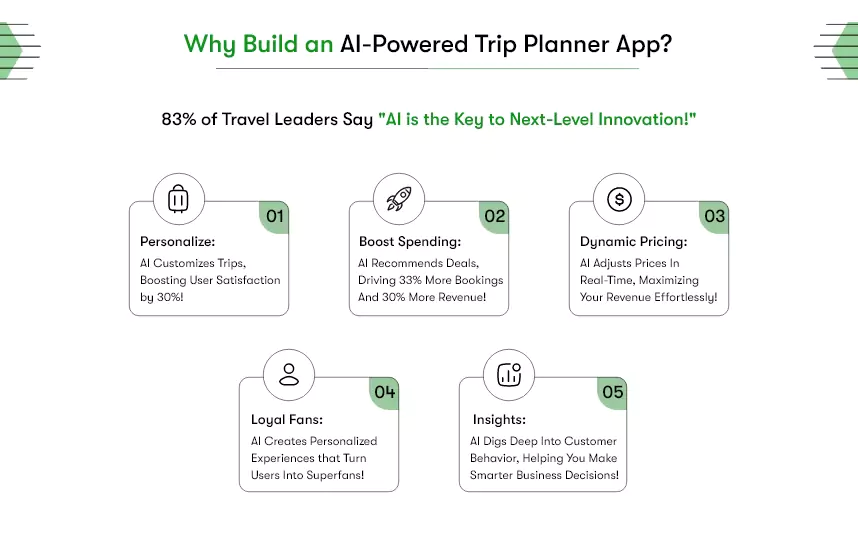
An AI-powered trip planner app functions beyond booking flights or hotels. Traditional apps require travelers to manually compare endless options, which often creates frustration. In contrast, an AI trip planner app organizes data from multiple sources to deliver highly accurate and personalized itineraries.
Travel companies that focus on trip planner app development and invest in AI app development services can provide seamless experiences while securing stronger market positions. Hopper demonstrates this capability by using predictive algorithms to suggest optimal booking times, which increases user engagement and satisfaction across its global customer base.
Building an intelligent itinerary app also strengthens brand trust. Data privacy is critical, and compliance with GDPR or CCPA standards ensures traveler confidence. When travelers see transparency and reliability, they remain loyal and continue relying on the app for future trips.
Business Advantages of Building an AI-Powered Trip Planner App
- Personalized planning gives travelers tailored recommendations that improve satisfaction and encourage repeat usage.
- Real-time updates adjust itineraries instantly, helping travelers avoid booking stress and last-minute disruptions.
- Strong data compliance with GDPR and CCPA builds customer trust and reinforces brand credibility.
- Predictive insights highlight the best booking times, increasing user loyalty and long-term engagement.
What are the benefits of AI trip planner app development for travel businesses?
AI trip planner app development helps travel businesses increase revenue, improve loyalty, reduce churn, and lower costs. Companies also gain valuable traveler insights, enabling them to forecast demand, personalize services, and build long-term competitiveness in the fast-changing global travel market.
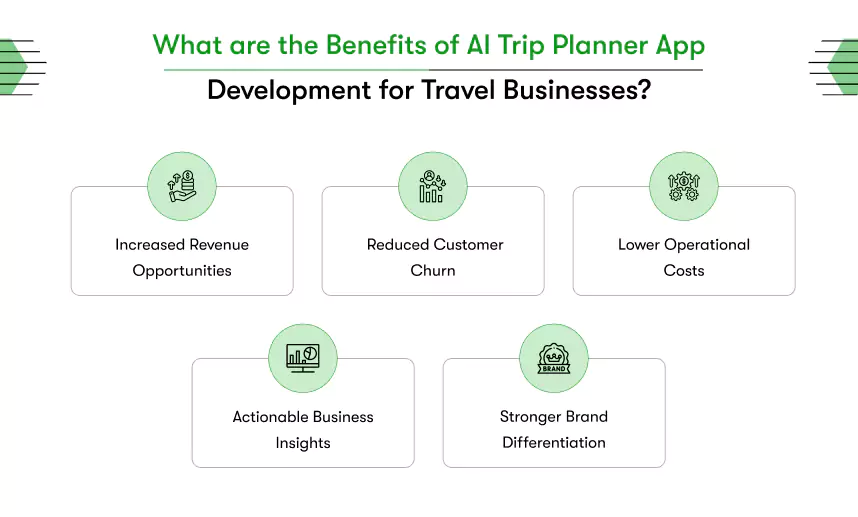
1. Increased Revenue Opportunities
Travel businesses earn higher revenue when upselling is personalized instead of generic. Hopper, for example, predicts flight prices and recommends bookings at optimal times, boosting traveler confidence and conversions. Personalized offers feel helpful, encouraging higher spending and increasing the value of each booking.
Through trip planner app development, companies recommend tours, dining, or upgrades aligned with traveler preferences. Travelers value relevance, which increases conversions and builds trust. As a result, revenue grows per customer, and businesses see consistent long-term financial gains.
2. Reduced Customer Churn
Retention remains a challenge across the travel sector. Static apps often fail to keep users engaged. An AI-powered trip planner adapts instantly when delays or cancellations occur, offering timely alternatives that maintain customer satisfaction and strengthen business relationships.
Companies that build AI trip planner apps keep travelers loyal with flexibility and responsiveness. When disruptions are managed smoothly, travelers stay engaged and rarely switch providers. Reduced churn creates stronger lifetime value, protecting market share in a competitive industry.
3. Lower Operational Costs
Support teams spend significant hours addressing repetitive customer questions. AI-powered tools such as chatbots, automated rebooking, and smart notifications reduce agent workloads. These features resolve issues quickly, cutting costs while keeping service quality high.
Expedia has already deployed AI chatbots to manage booking questions and flight updates effectively. Similar features save costs for companies that build AI trip planner apps. Lower expenses allow businesses to reallocate resources, improving both efficiency and innovation potential.
4. Actionable Business Insights
Every traveler interaction generates valuable data. AI converts this information into insights, identifying peak demand periods, popular destinations, and booking patterns. Businesses use these insights to forecast demand, plan targeted campaigns, and optimize inventory before competitors respond.
Analytics within itinerary app development provide managers with clear, data-driven strategies. Deloitte reports that 60% of travelers prefer personalized offers from apps they trust, proving that predictive insights directly improve customer loyalty and marketing outcomes.
5. Stronger Brand Differentiation
The travel app market in 2025–26 will become increasingly crowded. Travel companies that integrate AI gain clear differentiation. Offering predictive planning, personalization, and responsive features demonstrates innovation and builds trust with travelers who value convenience and reliability.
Companies that build intelligent itinerary apps position themselves as forward-looking and dependable. Consistently delivering relevant, helpful experiences makes businesses stand out and ensures long-term competitiveness in a saturated travel landscape.
What are the must-have features of an AI trip planner app in 2025–26?
The must-have features of AI trip planner app development in 2025–26 include itinerary generators, real-time updates, booking integrations, personalization, offline access, group planning, and analytics dashboards. These features improve traveler experiences while strengthening business competitiveness across the travel industry.
1. AI-Based Itinerary Generator
An itinerary generator builds personalized schedules using preferences such as budget, interests, and available time. For example, cultural travelers receive museum recommendations before nightlife. Travelers save effort, and companies earn trust by offering tailored journeys through accurate scheduling features.
Incorporating this feature during trip planner app development improves engagement significantly. Travel companies that build AI trip planner apps encourage repeat usage and loyalty. Itinerary generators form the backbone of AI-powered travel booking app development for modern businesses targeting global markets.
2. Real-Time Updates
Travel disruptions damage traveler trust instantly. Real-time updates notify users about delayed flights, unavailable hotels, or weather alerts immediately. Quick alerts prevent wasted time and frustration, positioning apps as reliable partners who help travelers overcome unpredictable challenges efficiently.
Companies that build AI trip planner apps with real-time updates improve traveler confidence and retention. Dependable notifications create stronger trust and increase engagement, positioning apps as dependable solutions in competitive travel markets globally.
3. Smart Booking Integrations
Modern travelers prefer seamless booking experiences across flights, hotels, and events. Smart booking integrations connect apps with external APIs, eliminating platform switching. This unified approach simplifies planning, improves convenience, and ensures customers complete transactions inside the same ecosystem.
For businesses, integrations increase conversion rates and transaction values. Through AI-powered travel booking app development, companies improve revenue streams and strengthen customer loyalty. Smart booking features deliver higher profitability while reinforcing trust in comprehensive, end-to-end travel planning solutions.
4. Personalized Recommendations
Travelers expect relevant suggestions rather than overwhelming options. AI analyzes booking history, spending behavior, and interests to deliver meaningful recommendations. Suggested tours, dining, and experiences improve satisfaction, helping travelers feel understood while strengthening trust in travel planning technology.
Personalization within itinerary app development creates new revenue streams while increasing engagement. Companies that build intelligent itinerary apps provide useful offers without overwhelming customers, driving loyalty and long-term adoption across competitive global travel markets.
5. Offline Access
Connectivity issues frustrate international travelers frequently. Offline access ensures maps, booking confirmations, and itineraries remain available without internet. Dependability builds user confidence, reduces complaints, and strengthens the app’s reputation for reliability in crucial travel situations worldwide.
Travel businesses that build intelligent itinerary apps with offline features create differentiation. Dependable offline tools enhance credibility, strengthen trust, and guarantee utility even in regions with limited connectivity, reinforcing long-term adoption across varied travel markets globally.
6. Group Travel Planning
Group trips often create confusion with scattered communication. To solve this, integrated planning features consolidate itineraries so families, friends, or teams can coordinate schedules in one place. This unified approach keeps everyone aligned and reduces the hassle of managing multiple chats or apps.
Collaboration reduces errors, strengthens convenience, and ensures better shared travel experiences for participants.
Integrating group features within the trip planner app development captures demand from family and corporate travel segments. Companies that build intelligent itinerary apps with group functionality expand reach, strengthening adoption across high-value travel markets internationally.
7. Analytics Dashboard for Businesses
Analytics dashboards transform traveler data into strategic intelligence. Businesses track revenue patterns, booking trends, and seasonal peaks. Managers forecast demand, optimize campaigns, and refine offerings based on accurate, real-time insights delivered through integrated dashboards.
Learning how to build a travel planning app with analytics ensures smarter business growth. Predictive insights guide resource allocation, reduce waste, and improve profitability. Analytics tools create significant competitive advantages for businesses operating in fast-changing travel industries worldwide.
AI trip planner app development delivers clear business gains and traveler convenience. Companies increase revenue, reduce costs, and build loyalty while travelers enjoy personalized, reliable, and stress-free planning experiences.
AI-powered travel booking app development gives businesses a lasting edge. Companies that build intelligent itinerary apps today secure growth and customer trust. The next step is learning how to build a travel planning app effectively.
How does an AI trip planner app work behind the scenes?
An AI trip planner app backend collects traveler inputs, processes data, and generates itineraries through APIs, machine learning, and real-time monitoring. Strong backend design ensures accurate personalization, scalable features, customer trust, and long-term value for travel businesses.
1. Intent Recognition and User Context
When travelers enter preferences, natural language processing interprets intent. For example, “3 days in Rome under $2,000” becomes structured parameters. Accurate recognition reduces failed searches, which is critical for trip planner app development focused on building customer confidence and satisfaction.
2. Data Retrieval and Aggregation
The backend connects with APIs from airlines, hotels, and event providers. It filters large datasets instantly to deliver accurate matches. Companies that build AI trip planner apps gain advantages by providing travelers with real-time prices and availability without unnecessary delays.
3. Itinerary Planning Engine
The itinerary planning engine combines costs, routes, and preferences into optimized schedules automatically. This functionality reduces planning effort and increases customer satisfaction. In AI trip planner app development, the itinerary engine strongly influences retention, trust, and repeat usage among modern travelers.
4. Recommendation System
Machine learning models study traveler history and context to suggest tours, restaurants, or cultural experiences. Each recommendation aligns with personal interests rather than random suggestions. Businesses benefit because relevant offers improve conversions, proving that AI-powered travel booking app development increases direct revenue streams.
5. Real-Time Monitoring and Replanning
The backend monitors data streams for weather, traffic, or airline delays. When disruptions occur, the system reshuffles itineraries instantly. Real-time adjustments increase traveler confidence, demonstrating the long-term ROI of intelligent itinerary app development for competitive travel businesses worldwide.
6. Analytics and Insights
Every traveler action generates data that becomes business intelligence. Dashboards highlight demand patterns, seasonal peaks, and spending behaviors. Companies that know how to build a travel planning app with analytics forecast demand accurately, refine campaigns, and strengthen resource allocation effectively.
Why strong backend systems matter in AI trip planner apps
Backend processes create more than efficiency. They build trust through accuracy, generate loyalty with personalization, and increase revenue through intelligent recommendations. Strong backend design in itinerary app development ensures scalability, customer confidence, and sustainable growth for travel businesses in 2025–26.
How to build an AI trip planner app that delivers business growth in 2025–26
Building an AI trip planner app in 2025–26 requires defining business goals, studying competitors, mapping features, selecting strong partners, testing thoroughly, and promoting strategically. Each step in the trip planner app development must align with measurable business outcomes and customer expectations.
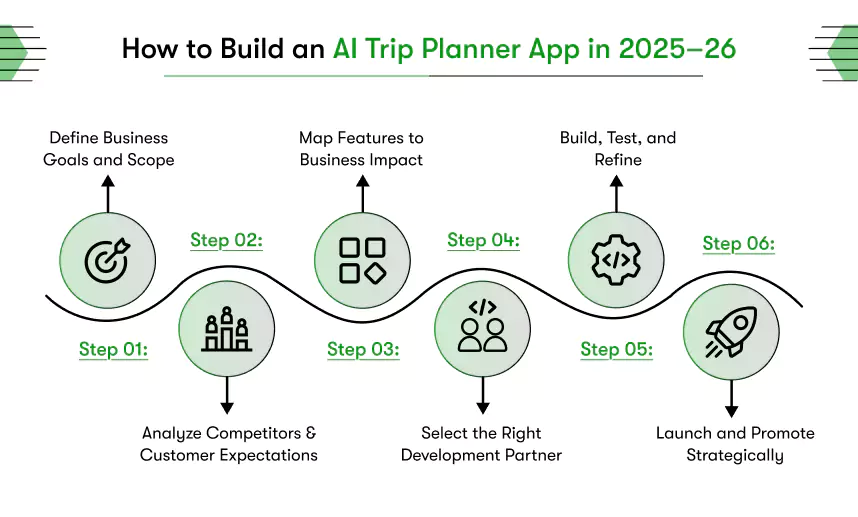
Step 1: Define business goals and scope
Travel businesses must clarify what outcomes the app should achieve. Objectives can include increasing retention, improving upsells, or delivering stress-free itineraries. Clear business goals guide every decision in AI trip planner app development, ensuring measurable ROI from the final product.
Companies that build AI trip planner apps with strong goals measure success through loyalty, conversions, and revenue. For example, personalization targets repeat bookings, while automated rebooking reduces churn. Clear scope creates a foundation for scalable, long-term success in competitive travel markets.
Step 2: Analyze competitors and customer expectations
Competitor analysis identifies gaps where new solutions can thrive. Apps like Google Travel, Hopper, and TripIt dominate specific functions. Google Travel excels at timing insights, while Hopper leverages predictive pricing. These examples highlight opportunities for differentiated trip planner app development.
Travel businesses that build intelligent itinerary apps must address unmet customer expectations. If existing apps fail at group planning, your solution should focus on collaboration features. Meeting traveler needs directly builds competitive advantage and increases adoption across global markets.
Step 3: Map features to business impact
Every feature must connect directly to business performance. Real-time alerts reduce missed flights, personalization increases cross-selling, and offline access strengthens reliability abroad. Prioritizing impact ensures each investment in itinerary app development delivers measurable results in loyalty, satisfaction, and profitability.
Businesses that know how to build a travel planning app strategically unlock higher revenue per user. For instance, predictive itinerary generators increase engagement, while analytics dashboards improve resource allocation. Mapping features to outcomes prevents wasted effort and maximizes competitive differentiation.
Step 4: Select the right development partner
Selecting a specialized partner ensures scalability, compliance, and reliable delivery. Unlike freelancers, an established travel app development company manages integrations, design, testing, and security comprehensively. Strong partners reduce risks, accelerate timelines, and support businesses through complex AI-powered travel booking app development projects.
A reliable partner also ensures compliance with GDPR and CCPA requirements, building traveler trust. Companies that build AI trip planner apps with expert guidance secure faster launches, improved stability, and long-term growth while reducing technical debt and operational delays.
Step 5: Build, test, and refine
The development process covers wireframes, UI design, AI model integration, and quality testing. Testing validates performance, privacy, and scalability before launch. Continuous refinement ensures the app aligns with evolving traveler expectations and protects investments in intelligent itinerary app development.
Businesses that build AI trip planner apps with disciplined testing reduce rework significantly. Rigorous validation increases traveler trust, boosts adoption, and safeguards brand reputation. A thorough development cycle ensures the app delivers dependable performance under diverse real-world conditions.
Step 6: Launch and promote strategically
Even the best features fail without visibility. Strategic promotion through influencer partnerships, targeted ads, and community outreach accelerates adoption. Businesses combining marketing with trip planner app development convert downloads into long-term revenue streams faster and more effectively.
Strong campaigns also highlight unique features such as real-time updates or group planning. Companies investing in AI-powered travel booking app development with integrated marketing gain rapid recognition, increased trust, and sustainable adoption across local and global travel audiences.
Why a structured approach to AI trip planner app development matters
A structured approach to itinerary app development ensures more than technology delivery. It guarantees measurable business results by connecting every decision to revenue, loyalty, and retention. Businesses that build intelligent itinerary apps with structure remain competitive in 2025–26 and beyond.

Actionable tips for AI trip planner app development success in 2025–26
AI trip planner app development success depends on understanding travelers, integrating strong tools, designing user-friendly experiences, and adding advanced AI features. Each tip aligns development decisions with measurable outcomes, including higher retention, reduced churn, and stronger lifetime value for businesses.
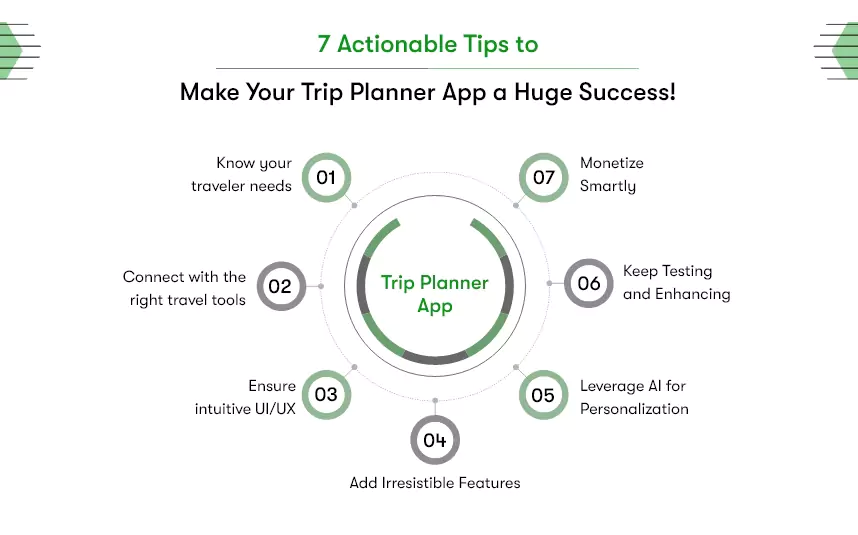
1. Understand traveler needs deeply
Travel products succeed when businesses align features with real traveler behaviors. Segmentation must go beyond demographics to include groups such as budget travelers, luxury professionals, or adventure seekers. Understanding preferences ensures features resonate and strengthen long-term user adoption rates.
TripIt achieved growth by solving a pain point: travelers lacked centralized itineraries. Adoption increased rapidly after addressing that specific issue. Companies applying trip planner app development strategies to map customer needs gain measurable retention improvements and reduced churn compared with generic travel platforms.
2. Connect with reliable travel tools
Backend integrations define whether customers complete bookings successfully. Airlines, hotels, activity platforms, and mapping services must synchronize seamlessly. McKinsey reports that 71% of consumers expect companies to deliver personalization and efficiency simultaneously, highlighting the importance of reliable system integrations.
Businesses investing in trip planner app development with strong integrations improve conversions by retaining bookings within the app ecosystem. Skyscanner illustrates this outcome effectively: seamless aggregation of multiple suppliers increased bookings, reduced abandonment, and strengthened loyalty across highly competitive travel markets.
3. Prioritize user-friendly design
Complicated travel apps frustrate customers, increasing churn before bookings finalize. User-friendly experiences demand short booking flows, simple itinerary management, and smooth accessibility across devices. Google Travel demonstrates this advantage by guiding travelers clearly from inspiration to completed bookings with minimal friction.
Companies using itinerary app development strategies to improve usability consistently see better reviews and higher daily active users. Reduced support inquiries lowered costs significantly. Simplified designs improve adoption while building trust among users who expect modern apps to save time effortlessly.
4. Add advanced features for differentiation
Basic functionality will not retain travelers in 2025–26. Companies must integrate AI-driven features, including predictive pricing, personalized itineraries, and contextual recommendations. These features build loyalty, strengthen engagement, and expand lifetime value by creating meaningful, data-driven travel planning experiences.
Businesses that build AI trip planner apps with advanced features outperform competitors offering basic booking services. Intelligent recommendations transform utilities into trusted digital companions. Strategic upgrades in AI-powered travel booking app development ensure revenue growth, customer trust, and strong competitive positioning worldwide.
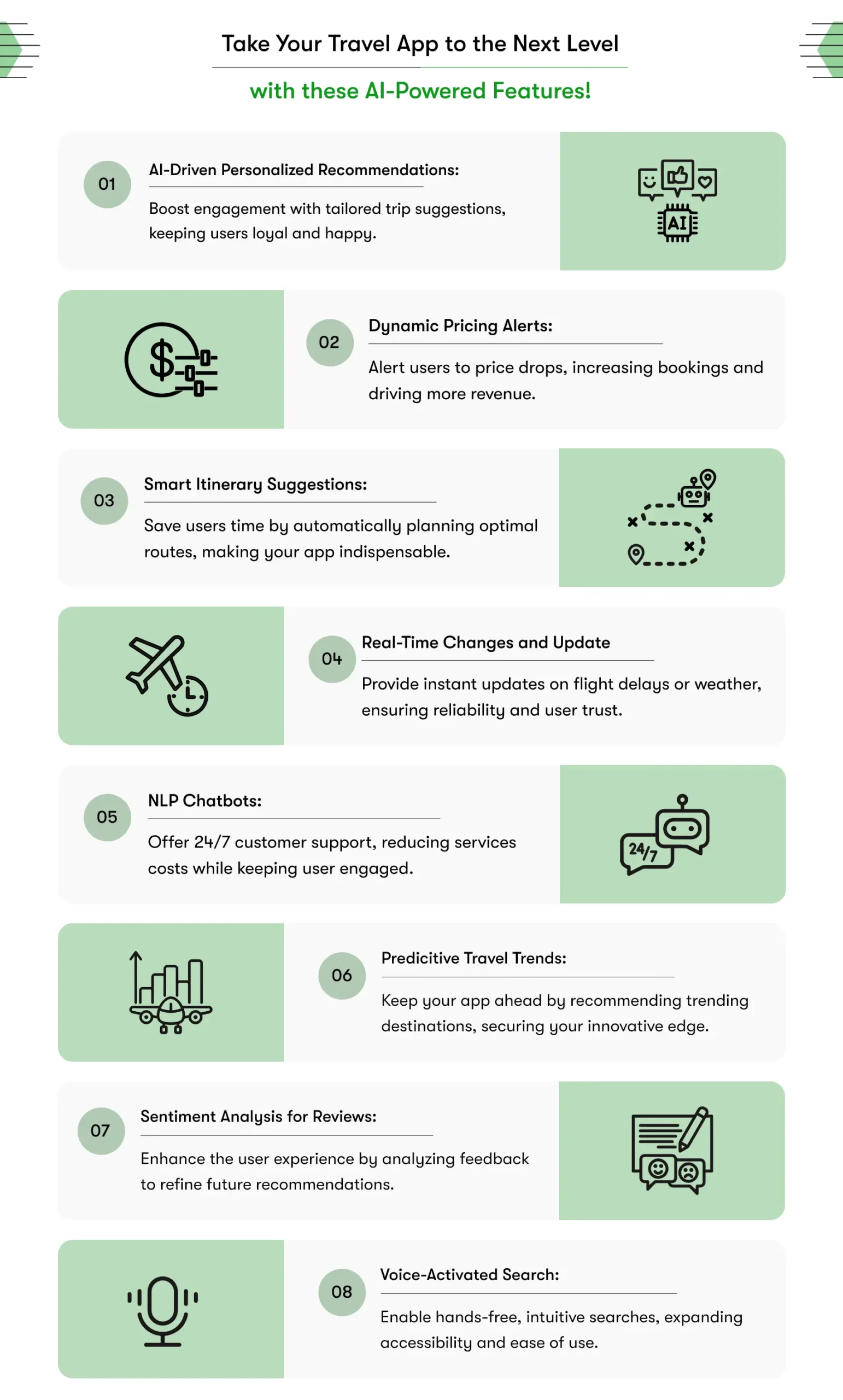
5. Use AI to personalize and assist
AI transforms static apps into interactive travel companions. Machine learning suggests activities, hotels, and dining aligned with user interests. Natural language processing enables conversational support, while predictive algorithms automatically adjust itineraries when disruptions occur, keeping traveler experiences seamless and reliable.
Personalization directly increases upselling opportunities, loyalty, and engagement. Companies using an AI trip planner app development for contextual support strengthen retention and reduce churn. Personal assistance evolves planning apps into valuable partners that travelers continue trusting for future journeys worldwide.
Must-have Trip Planner App Features
| Category | Feature | Description |
| Exploration | Search and Filter Options | Allows users to search for flights, hotels, and activities, filtering results by price, location, or rating. |
| Map Integration | Provides location-based services, showing nearby attractions, restaurants, and hotels. | |
| Destination Guides | Offers detailed information on various destinations, including travel tips, local culture, and must-see attractions. | |
| Profile | User Registration and Profiles | Enables users to create accounts, store personal details, and access travel history. |
| Saved Preferences | Allows users to save their travel preferences, such as favorite airlines, hotel chains, or types of activities. | |
| Travel History | Tracks past trips and stores itineraries, bookings, and personal notes for easy reference. | |
| Travel Products | Booking System | Integration with booking engines for flights, hotels, and activities directly within the app. |
| Itinerary Management | Users can create and manage trip itineraries, adding flight times, hotel check-ins, and activity schedules. | |
| Payment Gateway Integration | Secure payment options for booking and in-app purchases, ensuring safe transactions. | |
| Updates | Notifications and Alerts | Sends reminders about flight times, hotel check-ins, and other important details. |
| Real-Time Updates | Provides live updates on flight statuses, weather conditions, and changes in travel plans. | |
| Local Event Updates | Alerts users to events happening in their destination, such as festivals, concerts, or seasonal attractions. | |
| User-Specific | Personalized Recommendations | Suggests destinations, hotels, and activities based on user preferences and past behavior. |
| Language Support | Offers multi-language support for users from different regions. | |
| Customer Support Access | Easy access to customer support, including options like chat, email, or phone. | |
| Functionality Specific | Offline Access | Allows users to access their itineraries and important details without an internet connection. |
| Multi-Currency Support | Displays prices in the user’s preferred currency for easier decision-making. | |
| Integration with Calendar | Syncs travel plans with the user’s calendar app for better organization. |
6. Test and improve continuously
Launching with a minimum viable product helps validate concepts faster and reduce initial risks. Continuous testing verifies performance across devices, ensures scalability during peak demand, and confirms compliance with data privacy frameworks, including GDPR and CCPA regulations internationally.
Data-driven improvements refine usability, strengthen adoption, and increase satisfaction. Businesses applying structured updates in itinerary app development reduce acquisition costs, protect brand reputation, and deliver sustainable performance while maintaining trust with modern travelers who expect reliability consistently.
7. Monetize through diverse models
Revenue strategies must align with features early in the roadmap. Beyond traditional commissions, businesses can integrate affiliate marketing, premium subscriptions, in-app bookings, or white-label licensing. Each model impacts revenue differently, balancing predictable income with scalable revenue opportunities.
Companies that build intelligent itinerary apps with multiple monetization models increase booking values and diversify income streams. Strategic monetization planning during how to build a travel planning app initiatives strengthens profitability, maximizes long-term ROI, and ensures resilience against competitive market pressures.
Personalization, continuous testing, and monetization strategies determine whether apps stagnate or lead markets. Businesses that invest in AI trip planner app development with reliable integrations, user-friendly design, and intelligent features attract loyal travelers, maximize revenue opportunities, and scale confidently in 2025–26.
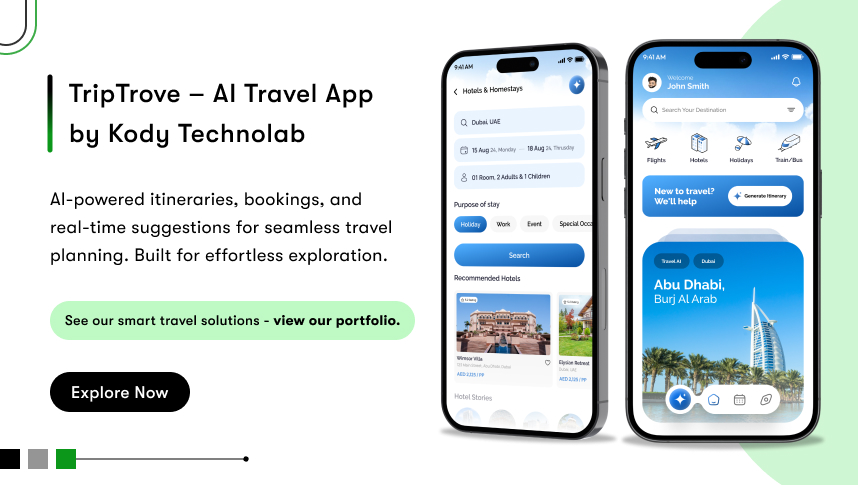
How much does an AI trip planner app development cost in 2025–26?
AI trip planner app development in 2025–26 typically costs between $30,000 and $150,000+, depending on project scope, chosen features, and developer location. Annual costs for maintenance and AI APIs often add another 15–20%, making accurate planning critical for ROI.
Cost Breakdown by Team Composition
| Development Model | Typical Cost Range | Business Fit & Considerations |
| Internal Team | $100,000 – $150,000+ | Full control, slower speed, higher overhead costs, long-term |
| Dedicated Agency (Full-stack) | $70,000 – $120,000 | Reliable delivery, strong accountability, faster launch cycles |
| Offshore Contractor Team | $30,000 – $60,000 | Lean cost, quick scale-up, requires strong project oversight |
For travel businesses, choosing the right team model affects ROI directly. Building internally increases control but inflates the total cost of ownership. Agencies balance quality and speed. Offshore teams reduce initial costs, but governance and communication become critical.
Cost Breakdown by Region
| Region | Hourly Rate | Typical Total Cost | Key Advantage |
| North America | $100 – $150 | $100,000 – $150,000+ | Highest quality talent, premium pricing |
| Western Europe | $80 – $120 | $80,000 – $120,000 | Skilled developers, balanced costs |
| Eastern Europe | $40 – $70 | $40,000 – $70,000 | Mature developer ecosystem, cost efficiency |
| India / South Asia | $25 – $50 | $25,000 – $50,000 | Most cost-effective, requires careful oversight |
Region selection impacts cost, delivery speed, and oversight requirements. Companies that build AI trip planner apps often choose Eastern Europe or South Asia for cost savings, while complex builds in North America benefit from closer collaboration and tighter control.
Other Factors Affecting Your Budget
- Features and Functionality: Adding itinerary generation, predictive pricing, or voice-based search increases cost. Advanced AI personalization in itinerary app development requires higher investments.
- Design Complexity: Custom UI/UX, animations, and branding increase budgets but strengthen user adoption and engagement.
- Platform Choice: Native iOS, Android, or web apps cost more individually. Cross-platform frameworks like Flutter reduce time and cost. However, cross-platform app development with Flutter can save you time and money.
- Integrations: Secure connections with booking engines, maps, and payment gateways raise cost but enable smoother experiences.
- Maintenance: Ongoing updates, bug fixes, and compliance patches typically add 15–20% annually. Businesses that plan early reduce risks and protect ROI.
Accurate travel app development cost estimates are the foundation for effective planning in AI trip planner app development. Choosing the right team, region, and features directly impacts revenue, adoption, and scalability. Companies that know how to build a travel planning app with intelligent features and strong governance maximize ROI.
Conclusion: Build Your AI Trip Planner App with Kody Technolab
More than half of Gen Z and nearly six in ten Millennials now expect AI-powered planning for their trips. This growing demand makes AI trip planner app development essential for travel companies aiming to win loyalty and drive long-term revenue.
Kody Technolab specializes in AI trip planner app development that combines advanced personalization with measurable business outcomes. Businesses looking to hire AI developers can leverage our expertise to build intelligent itinerary apps that improve retention, increase booking conversions, and create sustainable revenue streams through automation and contextual recommendations.
When you build AI trip planner apps with Kody Technolab, you gain a trusted partner offering global talent, proven delivery models, and cost-efficient execution. Our team also ensures scalability, data security, and seamless integrations for businesses targeting international travel markets.
Ready to start your project? Contact Kody Technolab today to discuss how to build a travel planning app that travelers trust and businesses profit from in 2025–26.
Frequently Asked Questions about AI Trip Planner App Development
1. Who should consider investing in an AI trip planner app development?
AI trip planner app development is ideal for travel agencies, booking platforms, tour operators, and startups entering digital travel markets. Businesses aiming to improve personalization, automate planning, and increase booking value benefit most from building intelligent itinerary apps today.
2. How does an AI trip planner app improve customer loyalty?
AI trip planner apps improve loyalty by delivering personalized itineraries, instant updates, and relevant recommendations. Customers stay engaged because the app feels tailored, reliable, and helpful. This directly reduces churn and encourages repeat bookings across multiple trips.
3. Can small travel startups afford to build AI trip planner apps?
Yes. Small startups can build AI trip planner apps using phased development or MVP-first models. Starting lean allows validation of features without overspending. Once adoption grows, businesses can expand features and invest further in AI-powered travel booking app development.
4. What role does personalization play in itinerary app development?
Personalization is central to itinerary app development because it builds stronger trust. AI suggests activities, hotels, and experiences based on preferences, creating a digital assistant instead of a static booking tool. For businesses, personalization directly increases upselling, retention, and revenue.
5. How do businesses ensure data privacy in AI trip planner apps?
Businesses ensure data privacy by implementing secure APIs, encryption, and compliance with GDPR and CCPA standards. Protecting user data strengthens customer trust. Companies that build AI trip planner apps with strong privacy frameworks see higher adoption and stronger long-term loyalty.
6. What monetization strategies work best for AI-powered travel booking app development?
Best monetization strategies include affiliate bookings, premium subscriptions, curated upsells, and white-label licensing. Each model strengthens profitability differently. Companies that combine multiple approaches maximize average booking value, diversify revenue streams, and create sustainable business growth in highly competitive travel markets.
7. How do AI trip planner apps reduce operational costs for businesses?
AI trip planner apps reduce costs by automating repetitive tasks like rebooking, itinerary updates, and basic support. This lowers call center demand, shortens resolution times, and reduces staffing costs, while still improving customer satisfaction and retention for travel companies.

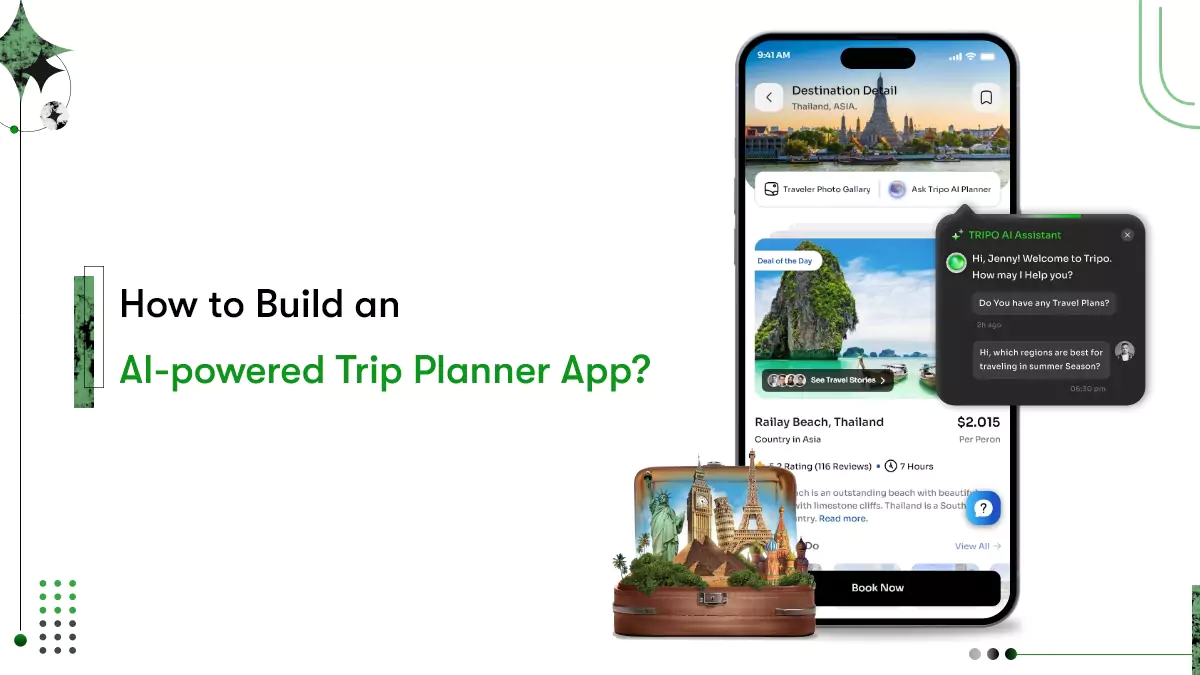




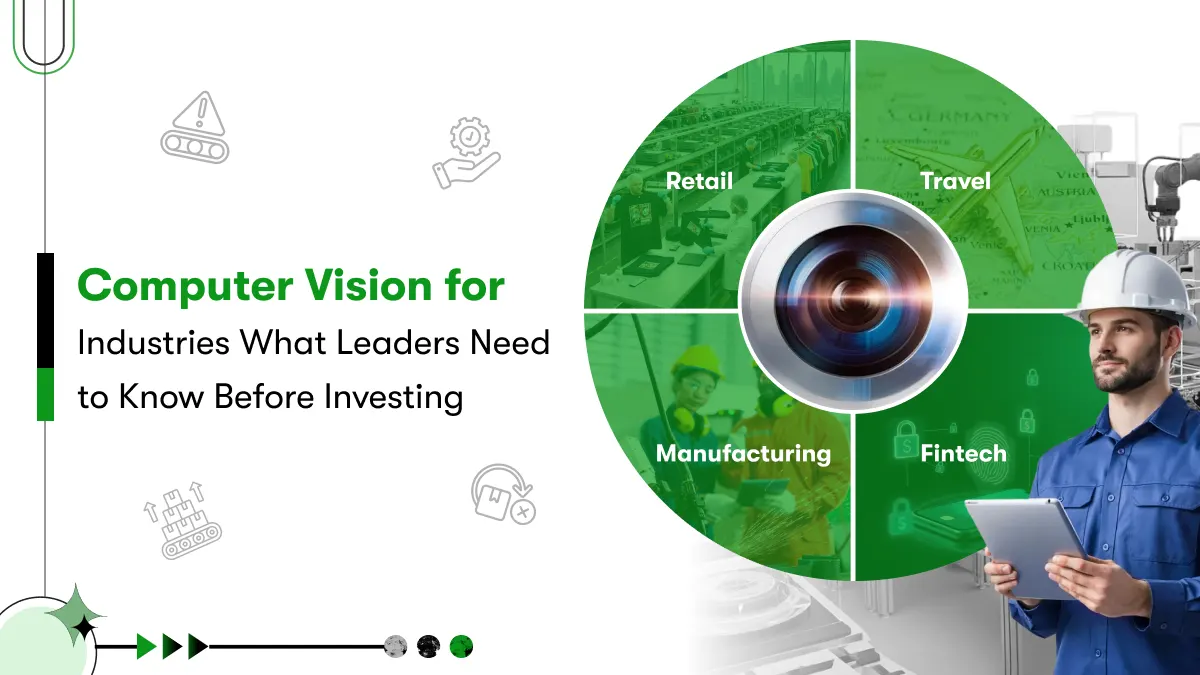






 Contact Information
Contact Information